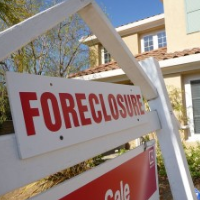Canadian Bank Buys Credit Card Debt to Threaten Californians with Foreclosure

Credit card debt is generally considered to be unsecured by any tangible asset, unlike a home-equity loan that can put a borrower’s home on the hook for missed payments.
However, California Watch reports that the National Bank of Canada is taking advantage of a loophole in the law to threaten hundreds of state homeowners with foreclosure if they don’t pay off credit card debt the financial institution bought up in a secondary market. Credigy Receivables, a unit of the bank, buys judgment liens from California lawsuits over unsecured debt and then files foreclosure lawsuits using the liens. The bank is also active in other states.
Although the amounts sought to satisfy the liens are often substantially less than the value of a home, failure by a homeowner to contest the lawsuit can end in a default judgment for the bank. In one case documented by California Watch, the bank went after a property that had already been foreclosed on and resold at auction to a new owner. The new, bewildered owner fortunately had title insurance through a company that settled the debt for $6,500.
State lawmakers attempted to address some of the issues raised by aggressive debt collectors like Credigy Receivables when state Senator Mark Leno introduced SB 890, the Fair Debt Buyers Practices Act, last year. The bill would have required the companies to verify the identity of the debtors they were pursuing and attest to the validity of the actual debts.
Those may seem like the kind of basic requirements that would exist in any financial transaction, but since banking deregulation in the 1990s broke down the walls between consumer and investment banking sectors, loans have been packaged into complex securities that are then sold, and sometimes resold repeatedly, to other financial institutions. By the time the loan ends up in the hands of a debt collector, it may not be at all clear who owes what to whom.
The bill would have made that knowledge mandatory. It passed the Senate but died in the Assembly Banking and Finance Committee when the Legislature adjourned in August.
California Attorney General Kamala Harris, a sponsor of the bill, said it was necessary to address wide-spread collection efforts “against the wrong person, or targeting debt that is time-barred or has already been paid. Collection efforts become increasingly misdirected as the consumer debt is repeatedly sold and resold without reliable documentation evidencing its origin.”
Leno, in his bill’s comment section, said, “Frequently, these debt collection actions are filed by debt buyers without proof that the debt ever existed. Yet actions proceed to judgment because ninety-five percent of consumers do not respond to these lawsuits—many because they do not receive notice—allowing the debt collector to take a default judgment against the consumer and levy against the consumer’s personnel accounts.”
Debt collection was the number one consumer complaint in California in 2010, according to the Federal Trade Commission (FTC). A report by the FTC that year concluded that the “system for resolving consumer debt collection disputes is broken and recommended a series of reforms. It found information provided by debt collectors was woefully lacking and that consumers, by and large, let the process unfold without ever actively participating in it.
–Ken Broder
To Learn More:
Canadian Bank Goes after Homes to Collect Credit Card Debts (by Rick Jurgens, California Watch)
National Bank of Canada Foreclosing Americans’ Homes over Credit Card Debt (by Stephen C. Webster, The Raw Story)
Senate Bill 890 (California Legislative Information)
- Top Stories
- Controversies
- Where is the Money Going?
- California and the Nation
- Appointments and Resignations
- Unusual News
- Latest News
- California Forbids U.S. Immigration Agents from Pretending to be Police
- California Lawmakers Urged to Strip “Self-Dealing” Tax Board of Its Duties
- Big Oil’s Grip on California
- Santa Cruz Police See Homeland Security Betrayal in Use of Gang Roundup as Cover for Immigration Raid
- Oil Companies Face Deadline to Stop Polluting California Groundwater





